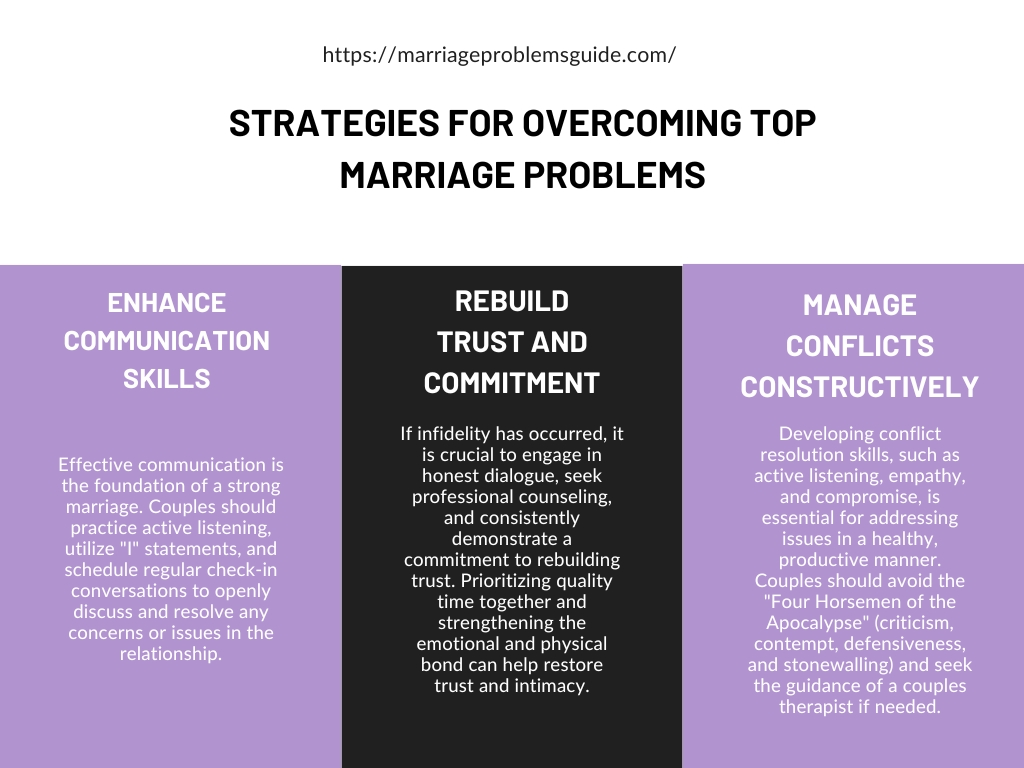Marriage is a beautiful and rewarding journey, but it’s not without its challenges. Every couple faces unique obstacles and difficulties that can put a strain on their relationship.
Understanding the common marriage problems and learning effective strategies to address them is essential for building a strong, lasting bond.
In this comprehensive guide, we’ll explore the top marriage problems and provide you with practical, research-backed solutions to help you overcome these hurdles and strengthen your marriage.
| Key Takeaways |
|---|
| – Communication breakdowns, infidelity and trust issues, financial disagreements, and lack of intimacy are among the top marriage problems couples face. |
| – Developing effective communication skills, rebuilding trust, establishing healthy financial practices, and nurturing intimacy are crucial strategies for overcoming these challenges. |
| – Collaborating on parenting responsibilities, managing conflicts constructively, and addressing addiction and mental health struggles can also strengthen a marriage. |
| – Seeking professional help, such as couples therapy or counseling, can be invaluable in navigating complex marriage problems and developing healthy coping mechanisms. |
| – Patience, empathy, and a genuine commitment to the relationship are essential in overcoming the top marriage problems and building a stronger, more resilient bond. |
| – Every marriage is unique, and the strategies that work for one couple may not necessarily work for another, underscoring the importance of an individualized approach. |
| – Regularly addressing and resolving issues, rather than letting them fester, is key to maintaining a healthy, fulfilling marriage over time. |
| – With the right tools and a collaborative mindset, couples can overcome the top marriage problems and create a more satisfying, lasting partnership. |
Understanding the Top Marriage Problems
Marriage is a complex and multifaceted relationship, and various issues can arise that can threaten the harmony and stability of the partnership. Let’s take a closer look at some of the most prevalent marriage problems:
- Communication Breakdown
- Ineffective communication, including poor listening skills, lack of emotional expression, and unresolved conflicts, can lead to misunderstandings, resentment, and a growing disconnect between partners.
- Infidelity and Trust Issues
- Betrayal of trust, whether through emotional or physical infidelity, can severely damage the foundation of a marriage and lead to feelings of hurt, anger, and a loss of intimacy.
- Financial Disagreements
- Disagreements over money management, spending habits, and financial goals can create ongoing tension and stress within the marriage, undermining the couple’s ability to work together as a team.

- Disagreements over money management, spending habits, and financial goals can create ongoing tension and stress within the marriage, undermining the couple’s ability to work together as a team.
- Lack of Intimacy and Affection
- A decline in physical and emotional intimacy, whether due to changes in life circumstances, stress, or underlying issues, can leave partners feeling disconnected and unfulfilled.
- Parenting Conflicts
- Disagreements over parenting styles, discipline methods, and the allocation of childcare responsibilities can strain the marriage and create a rift between the partners.
- Unresolved Conflicts and Resentment
- Failure to address and resolve conflicts in a healthy, constructive manner can lead to the buildup of resentment, bitterness, and a deterioration of the relationship over time.
- Addiction and Mental Health Struggles
- Issues such as substance abuse, gambling, or mental health problems in one or both partners can put a significant strain on the marriage and make it challenging to maintain a healthy, supportive relationship.
Understanding the common marriage problems is the first step in developing effective strategies to address them.
By recognizing the underlying causes and addressing them with care and understanding, couples can work towards strengthening their bond and building a more fulfilling, lasting relationship.
Strategies for Overcoming Marriage Problems
Now that we’ve explored the top marriage problems, let’s dive into practical strategies and techniques that can help you navigate these challenges and improve the overall health of your marriage:
- Enhance Communication Skills
- Practice active listening by giving your full attention, asking clarifying questions, and rephrasing to ensure understanding.
- Utilize “I” statements to express your feelings and needs, rather than blaming or attacking your partner.
- Schedule regular check-in conversations to discuss any concerns or issues, and actively work towards resolving them.
- Rebuild Trust and Commitment
- If infidelity has occurred, engage in honest, open dialogue and consider seeking professional counseling to work through the breach of trust.
- Commit to rebuilding trust by being transparent, accountable, and consistently demonstrating your dedication to the relationship.
- Prioritize quality time together, engage in activities that foster emotional and physical intimacy, and make deliberate efforts to strengthen your bond.
- Establish Healthy Financial Practices
- Create a joint budget and financial plan that aligns with your shared goals and values.
- Communicate openly about financial decisions, and work together to manage debts, savings, and investments.
- Seek the guidance of a financial advisor or counselor if necessary to help you navigate complex financial matters.

- Nurture Intimacy and Affection
- Regularly schedule date nights, romantic getaways, or other activities that allow you to reconnect and focus on your emotional and physical intimacy.
- Engage in non-sexual physical touch, such as hugging, hand-holding, and cuddling, to maintain a sense of closeness and affection.
- Explore new ways to express your love and appreciation for one another, whether through thoughtful gestures, words of affirmation, or acts of service.
- Collaborate on Parenting Responsibilities
- Discuss and establish clear, consistent parenting principles and guidelines that you both agree on.
- Regularly communicate about parenting challenges, and work together to find mutually acceptable solutions.
- Allocate childcare responsibilities fairly and be willing to compromise to maintain a harmonious family dynamic.
- Manage Conflicts Constructively
- Develop conflict resolution skills, such as active listening, empathy, and compromise, to address issues in a healthy, productive manner.
- Avoid criticism, contempt, defensiveness, and stonewalling, which are known as the “Four Horsemen of the Apocalypse” in relationships.
- Seek the guidance of a couples therapist or counselor if you struggle to resolve conflicts on your own.
- Address Addiction and Mental Health Struggles
- Encourage your partner to seek professional help for any addiction or mental health issues they may be facing.
- Educate yourself on the nature of the problem and how you can provide support and understanding.
- Participate in couples or family therapy to learn how to navigate these challenges together and strengthen your relationship.
Remember, overcoming marriage problems is not a one-time event but a continuous journey. By consistently applying these strategies and working together as a team, you and your partner can build a stronger, more resilient marriage that withstands the test of time.
Conclusion
Navigating the top marriage problems can be a daunting task, but it’s a necessary part of building a strong, lasting relationship.
By understanding the common issues that couples face and implementing the strategies outlined in this guide, you and your partner can work together to overcome these challenges and create a more fulfilling, satisfying marriage.
Remember, seeking professional support through couples counseling or therapy can be an invaluable resource in helping you navigate these complex issues.
With the right tools and a commitment to your relationship, you can weather the storms and emerge with an even stronger, more resilient bond.
Frequently Asked Questions (FAQs)
- What if my partner is not willing to work on the marriage problems?
- If your partner is unwilling to address the issues in the relationship, it’s important to have an open and honest conversation about your concerns.
- Encourage them to seek counseling or couples therapy, and be prepared to set boundaries if the situation does not improve. In some cases, it may be necessary to seek help from a therapist on your own to learn how to navigate the situation.
- How can I rebuild trust after infidelity?
- Rebuilding trust after infidelity is a gradual process that requires patience, honesty, and a genuine commitment from both partners. This may involve seeking professional counseling, open communication, and consistently demonstrating trustworthy behavior over an extended period.
- It’s essential to address the underlying issues that led to the infidelity and work together to prevent similar situations from occurring in the future.
- How can we better manage financial disagreements?
- Effective financial management in a marriage often involves creating a joint budget, establishing clear financial goals, and regularly communicating about money matters.
- It’s also important to seek the guidance of a financial advisor or counselor if necessary, and to be willing to compromise and find mutually agreeable solutions.
- What can we do to rekindle intimacy and affection in our marriage?
- Reigniting intimacy and affection in a marriage may involve scheduling regular date nights, engaging in new experiences together, and making a conscious effort to express love and appreciation through physical touch, words, and acts of kindness.
- Seeking professional guidance, such as from a sex therapist, can also be helpful if you’re struggling to reconnect physically and emotionally.
- How can we effectively resolve conflicts in our marriage?
- Effective conflict resolution in a marriage involves active listening, empathy, and a willingness to compromise. It’s important to avoid criticism, contempt, defensiveness, and stonewalling, and instead focus on understanding each other’s perspectives and finding mutually acceptable solutions.
- Seeking the guidance of a couples therapist can also be beneficial in learning healthy conflict resolution strategies.
Remember, every marriage is unique, and the strategies and solutions that work for one couple may not necessarily work for another. The key is to approach these challenges with patience, compassion, and a genuine commitment to preserving and strengthening your bond.



